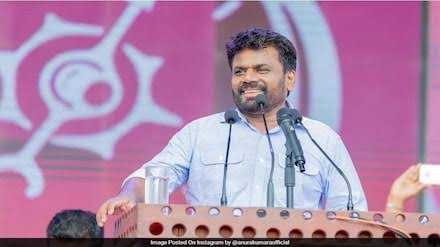Anura Kumara Dissanayake, the leader of the Janatha Vimukthi Peramuna (JVP), has emerged as a pivotal figure in Sri Lankan politics. Known for his Marxist roots and commitment to social justice, Dissanayake has set ambitious goals for his tenure, focusing on revitalizing Sri Lanka’s economy and eradicating racism.
A Brief Political History
Born on November 24, 1968, in Galewela, Sri Lanka, Dissanayake’s political journey began in his youth. He became actively involved in student politics during his university years, joining the Socialist Students’ Union, the student wing of the JVP. The JVP, originally a Marxist-Leninist party, has a tumultuous history marked by two armed insurrections in the 1970s and 1980s. Despite these violent beginnings, the party transitioned to democratic politics in the 1990s.
Dissanayake’s rise within the JVP was swift. By 1997, he was a member of the party’s Central Committee, and in 2000, he was elected to Parliament. His leadership has been characterized by a focus on anti-corruption, pro-poor policies, and a commitment to social equity.
Economic Reforms
One of Dissanayake’s primary objectives is to address Sri Lanka’s severe economic challenges. The country has been grappling with an economic crisis that has led to widespread poverty, inflation, and unemployment. Dissanayake has pledged to implement comprehensive economic reforms aimed at stabilizing the economy and promoting sustainable growth.
His economic strategy includes increasing transparency in government spending, reducing national debt, and fostering local industries. By prioritizing the needs of the working class and marginalized communities, Dissanayake aims to create a more equitable economic landscape.
Combating Racism
In addition to economic reforms, Dissanayake is committed to eradicating racism in Sri Lanka. The country has a long history of ethnic tensions, particularly between the Sinhalese majority and Tamil minority. Dissanayake has emphasized the importance of national unity and has proposed policies to promote inclusivity and social cohesion.
His approach includes educational reforms to foster mutual understanding and respect among different ethnic groups, as well as legal measures to protect minority rights. By addressing the root causes of racism, Dissanayake hopes to build a more harmonious and united Sri Lanka.
A Vision for the Future
Anura Kumara Dissanayake’s leadership represents a significant shift in Sri Lankan politics. His focus on economic recovery and social justice resonates with a populace eager for change. As he navigates the complexities of governance, his commitment to transparency, equity, and unity will be crucial in shaping Sri Lanka’s future.
Dissanayake’s journey from a student activist to a national leader underscores his dedication to the principles of Marxism and social justice. His tenure promises to be a transformative period for Sri Lanka, as he strives to create a more just and prosperous society.
What do you think about Dissanayake’s priorities for Sri Lanka?
